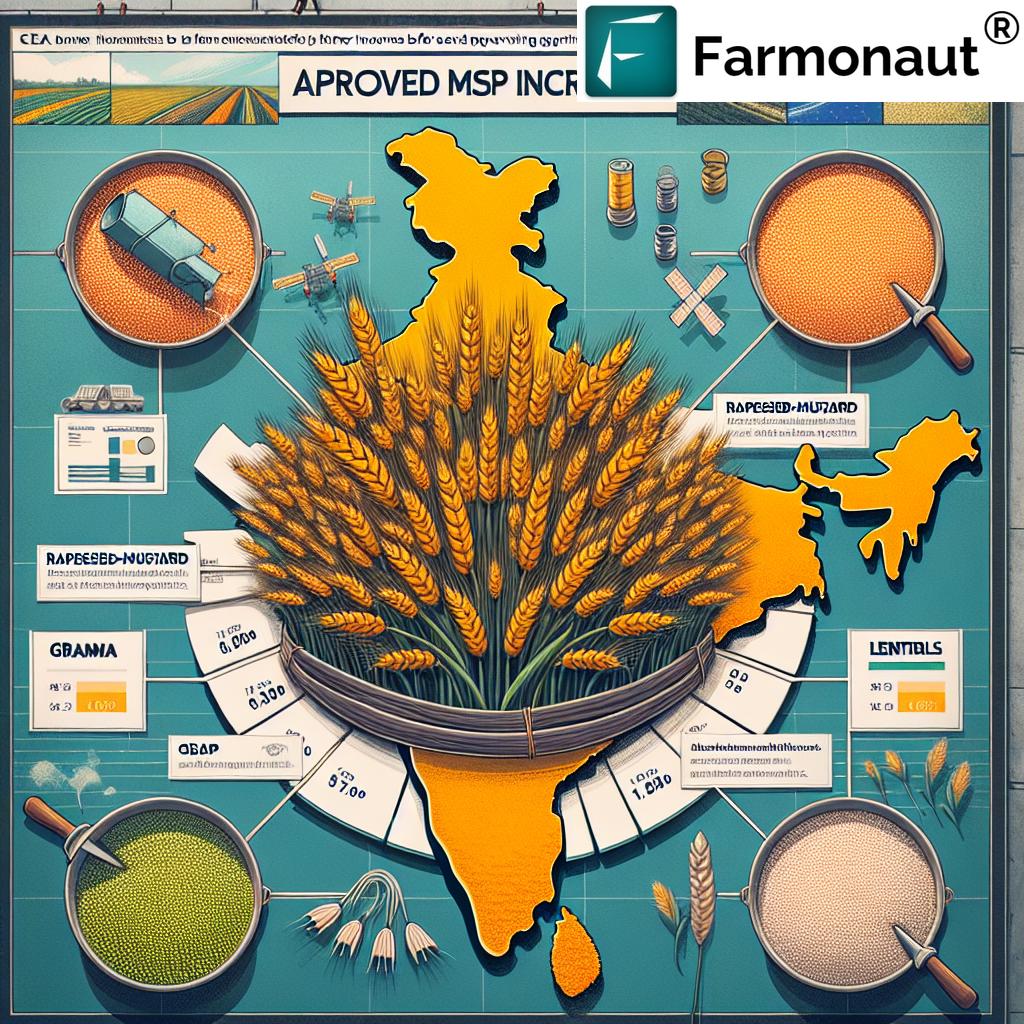Empowering Farmers: Chouhan’s Groundbreaking MSP Boost and Import Duty Hike Revolutionize Agricultural Policy

In a landmark move set to transform India’s agricultural landscape, Union Agriculture Minister Shivraj Singh Chouhan has unveiled a series of groundbreaking reforms aimed at empowering farmers and bolstering the nation’s agricultural sector. These sweeping changes, centered around a significant boost to the Minimum Support Price (MSP) and a strategic hike in import duties, are poised to revolutionize agricultural policy and provide much-needed support to India’s farming community.
MSP Boost: A Game-Changer for Indian Farmers
At the heart of Chouhan’s agricultural policy reform is a substantial increase in the Minimum Support Price for various crops. This move, approved by the Cabinet Committee on Economic Affairs (CCEA), is designed to ensure remunerative prices for farmers and promote sustainable agricultural practices.
- The MSP for Rabi Crops has seen a significant uptick, with rapeseed-mustard experiencing the highest rise at ₹300 per quintal.
- This aligns with the Union Budget’s ambitious goal of setting MSP at 1.5 times the production cost, a move that has been widely applauded by farmer unions and agricultural experts alike.
Chouhan emphasized, “This MSP boost for Indian farmers is not just about numbers. It’s about fulfilling Prime Minister Modi’s promise to ensure a 50% profit above production costs for our hardworking farmers. It’s about dignity, sustainability, and progress.”
Strategic Import Duty Hike: Protecting Domestic Oilseed Prices
In a bold move to safeguard domestic oilseed prices and support local farmers, the government has announced a substantial 27.5% import duty hike on foreign oils. This strategic decision is expected to have far-reaching implications for India’s agricultural economy.

The implications of this import duty hike are multifaceted:
- Boost to domestic oilseed prices, providing immediate relief to oilseed farmers
- Encouragement of domestic oilseed production, reducing reliance on imports
- Potential for increased investment in the domestic oilseed sector
Agricultural economist Dr. Ramesh Chand notes, “This import duty hike is a masterstroke. It not only protects our farmers but also paves the way for India to become self-sufficient in oilseed production.”
Soybean Crop Purchase at MSP: A Commitment to Farmers
In a move that has been warmly welcomed by farmer associations across the country, the government has committed to the soybean crop purchase at MSP from key states. This decision is set to provide a significant boost to soybean farmers, ensuring a stable and remunerative market for their produce.
Key aspects of this initiative include:
- Guaranteed purchase of soybean crops at MSP from major soybean-producing states
- Implementation of efficient procurement mechanisms to ensure timely payments to farmers
- Collaboration with state governments to streamline the procurement process
Crop diversification is at the forefront of this policy, with the government introducing crop diversification incentives to encourage farmers to explore a wider range of crops. This strategy aims to reduce the pressure on water resources, improve soil health, and enhance overall agricultural sustainability.
For farmers looking to leverage technology in their agricultural practices, Farmonaut’s mobile app offers cutting-edge solutions for crop monitoring and management.
Rabi Crops MSP Increase: A Boost for Winter Crop Farmers
The Rabi crops MSP increase is another crucial component of this comprehensive agricultural reform. This increase is set to benefit millions of farmers who cultivate winter crops, providing them with a much-needed financial cushion.
Notable increases in MSP for Rabi crops include:
- Wheat: ₹40 per quintal increase
- Barley: ₹75 per quintal increase
- Gram: ₹105 per quintal increase
- Lentil: ₹500 per quintal increase
These increases are not just numbers; they represent a significant step towards ensuring remunerative prices for farmers in India. The government’s commitment to supporting farmers through these price guarantees is expected to have a positive ripple effect across the entire agricultural sector.
For farmers interested in leveraging satellite technology for crop monitoring, Farmonaut’s Satellite API offers advanced solutions. Developers can access comprehensive documentation at the API Developer Docs.
Impact on Agricultural Policy and Sector Growth
These reforms represent a significant shift in India’s agricultural policy, with far-reaching implications for the sector’s growth and sustainability. By providing remunerative prices for farmers and encouraging crop diversification, the government is laying the groundwork for a more resilient and prosperous agricultural future.
Key impacts of these reforms include:
- Enhanced farmer income and financial security
- Promotion of sustainable farming practices
- Reduced rural-urban migration through improved agricultural prospects
- Potential for increased private sector investment in agriculture
Agricultural policy expert Ashok Gulati comments, “These reforms are transformative. They address the core issues facing Indian agriculture and set the stage for sustainable growth.”
Farmers can now access advanced agricultural technology through Farmonaut’s mobile apps:
Conclusion: A New Era for Indian Agriculture
The comprehensive reforms announced by Union Agriculture Minister Shivraj Singh Chouhan mark the beginning of a new era for Indian agriculture. From the significant MSP boost for Indian farmers to the strategic import duty hike on foreign oils, these measures are designed to address the longstanding challenges faced by the farming community.
As India moves forward with these ambitious reforms, the focus on providing remunerative prices for farmers, promoting crop diversification, and ensuring sustainable agricultural practices positions the country for significant growth in the agricultural sector. The commitment to purchasing soybean crops at MSP and the substantial increase in MSP for Rabi crops further underline the government’s dedication to farmer welfare.
These reforms not only promise immediate relief to farmers but also lay the foundation for long-term agricultural prosperity. As the sector adapts to these changes, the integration of technology and sustainable practices will be crucial. Platforms like Farmonaut, with its advanced satellite monitoring and agricultural management tools, are poised to play a significant role in this transformation.
As India embarks on this new agricultural journey, the world watches with keen interest. The success of these reforms could set a new benchmark for agricultural policy globally, potentially influencing how other nations approach farmer support and agricultural sustainability.
The road ahead is promising, with these reforms setting the stage for a more prosperous, sustainable, and technologically advanced agricultural sector in India. As Chouhan aptly put it, “This is not just about policy changes; it’s about transforming lives, ensuring food security, and building a stronger, more self-reliant India.”


